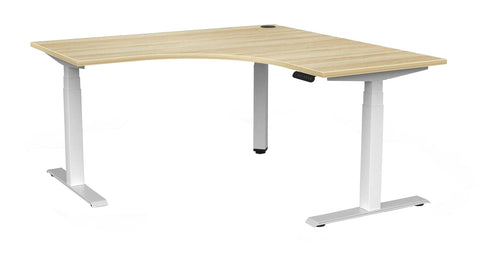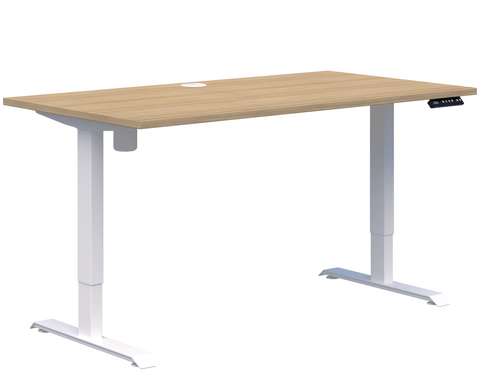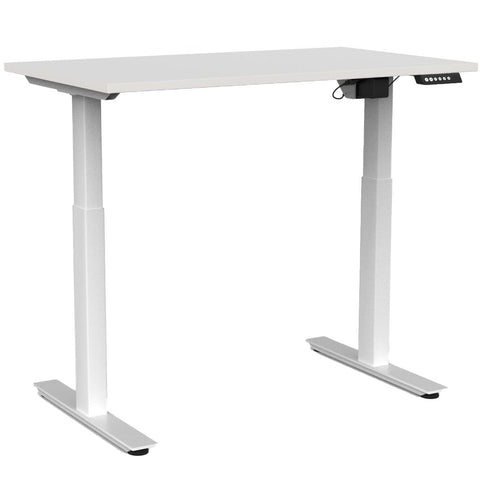In today's modern workplaces, the office desk serves as the focal point of productivity, creativity and professionalism. When it comes to selecting the ideal office desk, the material choice is crucial. Among the various options available, wood stands out as a timeless and versatile choice. But what are the best types of wood for an office desk? How thick should the desk's top be? What features should you look for in a desk?
Table Of Contents
What Are the Best Types of Wood for an Office Desk?
How Thick Should a Solid Wood Desk Top Be?
What Features Should I Look For In a Desk?
Why Wood For My Office Desk?
Conclusion
Let's dive into these questions and explore why wood is an excellent material for your office desk.
What Are the Best Types of Wood for an Office Desk?
When it comes to choosing the right and best wood for your office desk, several factors come into play, including durability, aesthetics, and budget. Among the sea of options available, a few standout choices have earned their place as the best types of wood for crafting office desks.
Oak
Oak is known for its strength and durability, making it an excellent choice for a desk that will withstand daily use.
It boasts beautiful grain patterns and comes in various finishes, from light to dark tones, allowing for customization to match your office decor.
Maple
Maple wood offers a sleek and modern appearance, making it perfect for contemporary office settings.
It's highly durable and resistant to scratches and dents, ensuring your desk maintains its pristine look for years to come.
One of the best spacious desk in NZ, available in Oak and Maple:

Cherry
Cherry wood exudes elegance and sophistication with its rich, reddish-brown hues.
It develops a beautiful patina over time, adding character to your desk and enhancing its appeal.
Walnut
Walnut is prized for its deep, chocolate-brown color and stunning grain patterns, making each desk unique.
It's a premium hardwood known for its strength and longevity, making it a worthwhile investment for your office.
Mahogany
Mahogany is renowned for its rich, reddish-brown color and luxurious appearance. It exudes warmth and sophistication, making it a popular choice for high-end furniture. Mahogany is prized for its durability and ability to take on a high polish, resulting in a lustrous finish that enhances its natural beauty.
Ash
Ash wood is known for its strength and resilience, making it an excellent choice for desks that endure heavy use. It has a light-colored, straight grain that lends itself well to a variety of finishes, from natural to stained. Ash is also relatively lightweight compared to other hardwoods, making it easier to work with and transport.
Office Desk made of Ash with multiple options:

Birch
Birch wood is prized for its pale color and smooth texture, which give it a clean, contemporary look. It is often used in modern furniture designs due to its versatility and ability to take on various finishes. Birch is also known for its stability and resistance to warping, making it a reliable choice for desks that need to maintain their shape over time.
In the end, there is no one best wood for a desktop as the choice depends largely on individual preferences, budget considerations, and the desired aesthetic of the workspace. Each type of wood offers its own unique characteristics, from the rich, luxurious tones of mahogany to the sleek, modern appeal of maple.
How Thick Should a Solid Wood Desk Top Be?
The thickness of the desk's top is essential for both aesthetics and functionality. A thicker desk top typically provides better stability and durability, especially if you plan to place heavy equipment or items on it. The thickness of the desk's top can also significantly impact its appearance. Thicker tops often convey a sense of luxury and sophistication.
In general, a solid wood desk top should be at least 1 inch thick for adequate strength and stability. However, thicker tops, ranging from 1.5 to 2 inches, are becoming increasingly popular for their aesthetic appeal and robustness.
While thicker desk tops offer undeniable benefits in terms of stability, durability, and aesthetic presence, there are also compelling reasons to consider desks with thinner tops. Embracing a sleeker profile can introduce a host of advantages that cater to different needs and design preferences.
Slimmer profiles are ideal for smaller work areas, with their lightweight nature making them easy to maneuver. They also exude a modern aesthetic and provide customization options, while potentially offering ergonomic benefits. Ultimately, whether you prefer the robust presence of a thicker desk top or the sleek elegance of a thinner one depends on your specific needs and design preferences.
What Features Should I Look For In a Desk?
When shopping for an office desk, it's essential to consider your specific needs and preferences. Here are some key features to look for:
- Working Surface: Ensure the desk offers enough surface area to accommodate your work essentials, such as a computer, paperwork, and other accessories.
- Storage Options: Consider desks with built-in storage solutions, such as drawers, shelves, or cabinets, to help keep your workspace organized and clutter-free.
- Ergonomic Design: Look for desks with adjustable height options or ergonomic features to promote comfort and reduce strain during prolonged periods of work.
- Quality Construction: Inspect the desk's construction for sturdy joints, smooth edges, and high-quality hardware to ensure long-lasting durability.
- Style and Aesthetics: Choose a desk that complements your office decor and reflects your personal style, whether it's modern, traditional, or somewhere in between.
Wooden standing desks in NZ, perfect blend of ergonomic design and aesthetics:


Agile Electric 2-Column Individual Desk
View our full collection of electric desks.
Why Wood For My Office Desk?
Wooden desks offer numerous benefits that make them an top choice for your office. Wood exudes warmth, sophistication, and timeless elegance, adding a touch of class to any workspace. Another great thing about them is that solid wood desks are built to l st, withstanding daily wear and tear and retaining their beauty for years to come. Unlike their synthetic counterparts, which may show signs of wear and tear over time, wooden desks age gracefully, developing a unique patina that adds character and charm to their appearance.
Furthermore, the ability to personalize wooden desks according to your preferences is a significant advantage. Whether you envision a rustic farmhouse-style desk with a distressed finish or a sleek, modern design with clean lines and minimalist accents, wood provides a versatile canvas for bringing your vision to life. With a myriad of customization options available, including wood species, stains, and hardware choices, you can create a desk that not only meets your practical needs but also reflects your personal taste and style.
Conclusion
In conclusion, selecting a high-quality wooden desk ensures a perfect balance of durability, aesthetics, and functionality. By considering factors such as wood type, desk top thickness, and personalization options, you can choose a desk that not only enhances productivity but also elevates the ambiance of your workspace.





